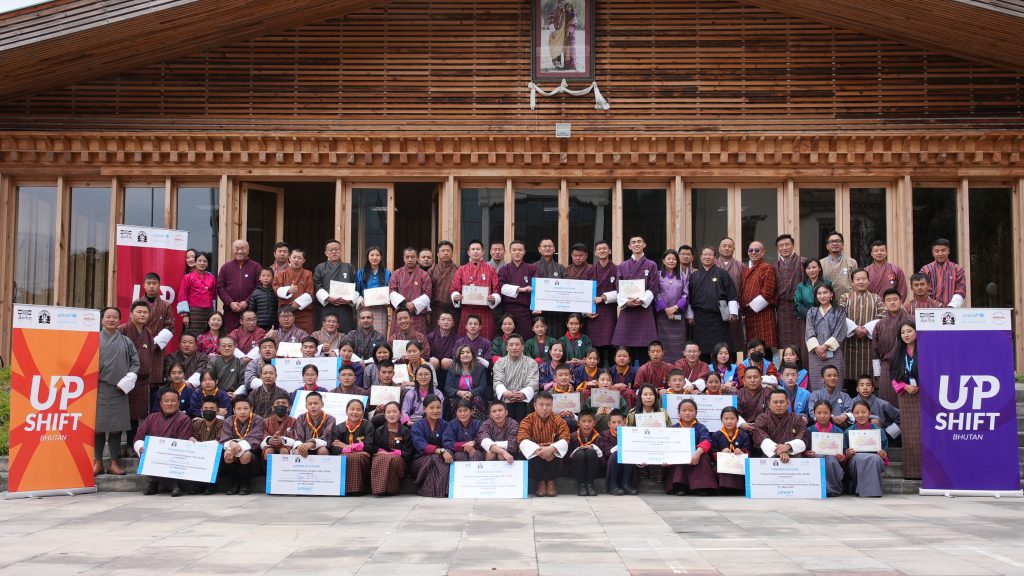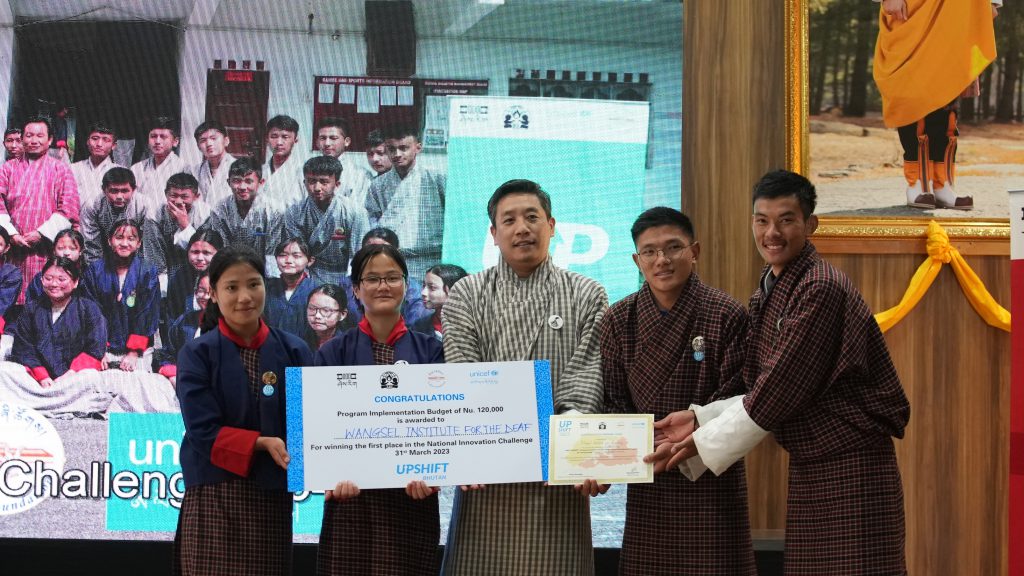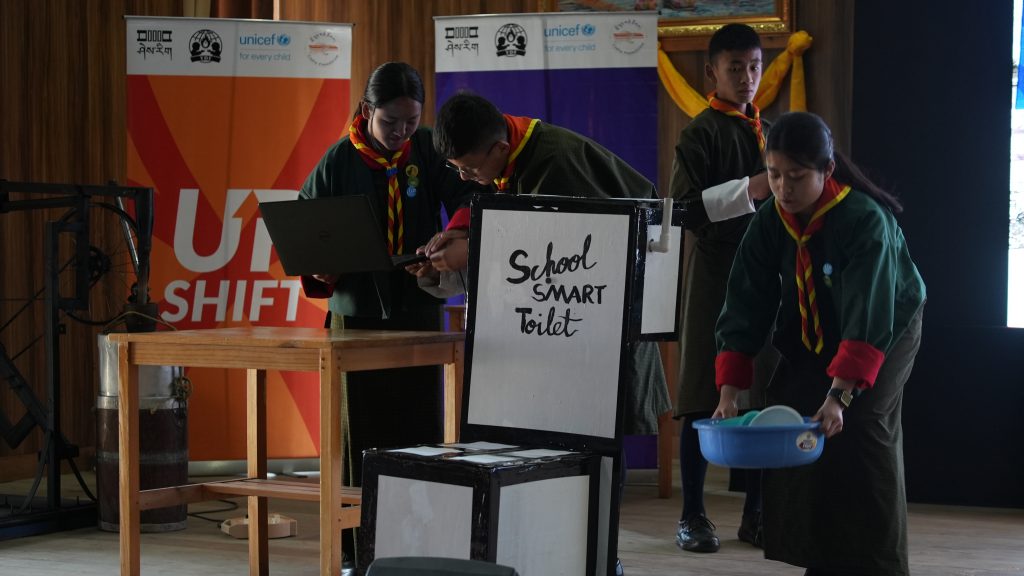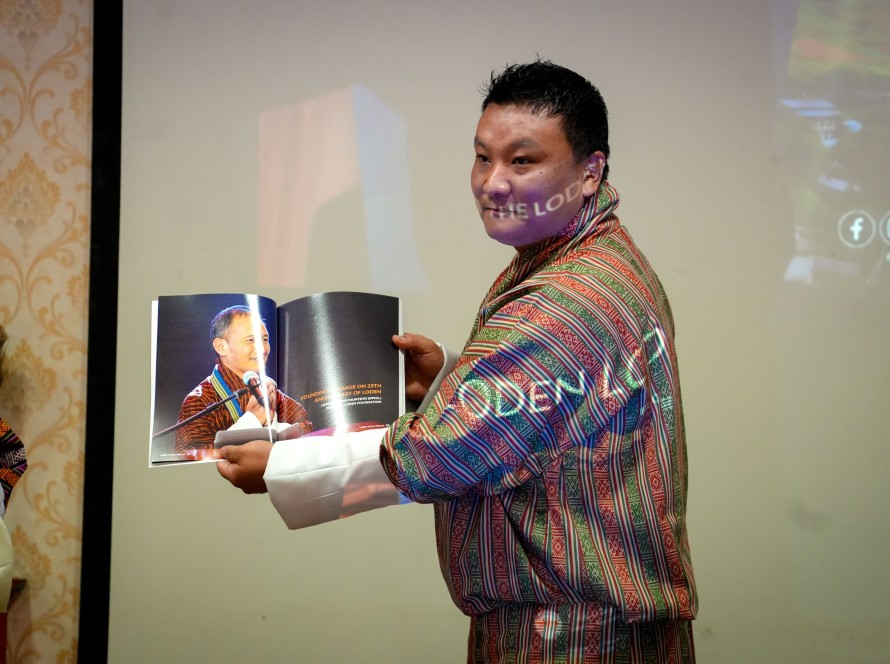Thimphu March 31, 2023: To encourage adolescents and young people to apply the skills and knowledge learnt during their engagement with the Adolescent Skills and Employability (ASE) Bhutan Project and to scale up their social innovation ideas, a National Innovation Challenge was held today in Thimphu.
Launched last year to equip adolescents and young people with life skills that would empower them to seize opportunities, confront challenges and access meaningful employment, the National Innovation Challenge selected the top six social innovation ideas for scale up from the 12 that were shortlisted for the national challenge.

The top two winners, Wangsel Institute for the Deaf, Paro and Khotokha Primary School, Wangdue won Nu 120,000 each to scale up their innovation ideas. Two first runners up, Mendrelgang Higher Secondary School in Tsirang and Gaupel Lower Secondary School, won Nu 100,000 each while the two second runners up, Yangchenphug Higher Secondary School in Thimphu and Langthel Lower Secondary School, Trongsa won Nu 80,000 each.
The ASE project was implemented through two programmatic approaches– UPSHIFT1 and UNISOLVE2, to support adolescents and young people in identifying social issues in communities, co-creating solutions using skills and knowledge they have learnt from the project, and implementing projects in partnership with community leaders, school management and other stakeholders.
Led by the Ministry of Education and Skills Development in partnership with Bhutan Youth Development Fund, Loden Foundation and UNICEF Bhutan, the ASE Bhutan Project was implemented in 65 schools and 10 youth centers through 75 focal persons, empowering 4,639 UPSHIFTERS including 2,496 females with a new set of 21st century skills such as communication skills, problem-solving, decision-making, negotiation skills, teambuilding, and co-creating solutions to address social issues in communities.

Director General with the Ministry of Education and Skills Development, Karma Galay said the ASE project complements the ongoing reform in the education sector including the Bhutan Baccalaureate (BB), which has been adopted as the main platform for school education reforms emphasizing on technology and other 21st Century skills.
“The use of UNISOLVE platform, which provides the discretion for students to complete self-paced online interactive curriculum shares similar feature to that of using motherboard in BB which is also a learning platform for students to continuously raise their bar,” the director general said. “There are plans to further upscale ASE in other schools.”
Executive Director of Youth Development Fund, Dorji Ohm said, UPSHIFT is a very important component towards enhancing, engaging and empowering young people with 21st century skills.
“Leveraging knowledge, generating new evidence and promoting innovative approaches through equipping young people has been a great journey. UNISOLVE platform has added a great opportunity towards online learning and bringing greater impact on young people,” the Executive Director said.
President of Loden Foundation Sangay Tshering, said the ASE/UPSHIFT is more than an innovation program.
“It is a critical mindset that inculcates positive engagement with local communities as change-makers. It is a learning beyond classroom walls. Today, we have witnessed the aptitude and skills of our young UPSHIFTERs in action, and we could not be more proud as an implementing partner.”
To support adolescents and young people to transit into the labour market, the ASE project will now also be offered in nine colleges. The project will continue in the pilot schools and scaled up in other schools.

Also known as transferable skills or life skills, 21st Century skills allow young people to become agile learners and global citizens equipped to navigate personal, social, academic and economic challenges. These skills also help young people affected by crisis cope with trauma and build resilience. They include problem-solving, negotiation, managing emotions, empathy and communication.
UNICEF Bhutan Representative a.i Nafisa Binte Shafique said empowering adolescent girls and boys, who are growing up in a transforming world with 21st century and employability skills are both critical and catalytical for them to reach their full potential and shape theirs as well as the country’s future.
“UNICEF is committed to continue our collaboration with the Ministry of Education and CSO partners to nurture tomorrow’s changemakers and social innovators,” Nafisa Binte Shafique said.
Leveraging the digital platforms and partnership, the ASE Project will inspire today’s young people to become tomorrow’s leaders. UNICEF and its Office of Innovation is supporting four countries in South Asia – Bangladesh, Bhutan, India and the Maldives to scale up skilling program for eight million young people.
####
Note
1 UPSHIFT is a youth social innovation and social entrepreneurship programme that supports adolescents and young people to identify problems in their communities and design solutions to tackle those problems. It is designed to bridge the gap between education systems and work environment.
2 UNISOLVE is a digital platform that helps young people develop the critical skills they need. It allows students to join as a team and complete a self-paced interactive online curriculum. They put their newly acquired knowledge into practice by identify problems in their communities and develop solutions to address them—applying research, prototyping, and iterative design methods throughout the process. The course culminates with a “pitch”, where students present their solutions for a chance to receive seed funding.



